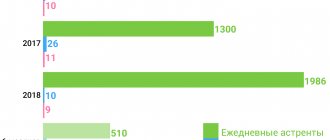As directly stated in paragraph 2 of Article 13 of the Civil Procedure Code of Russia in the latest edition, judicial demands, summonses, orders and decisions are binding on government agencies, corporations, companies and ordinary citizens within the jurisdiction of the document, regardless of location or registration. Paragraph 3 of the same article provides for administrative or criminal liability for failure to comply with a court decision by an individual. What punishment faces the offender and who determines the severity of the offense - in this article.
What is failure to comply with a court order?
A court decision is a ruling of a court of any instance, which can be legally appealed within a time specified by the legislator.
If there is no appeal and the decision has formally entered into force, all its objects must comply with the court’s demands in full and before the expiration of the period specified in the decision.
Refusal to execute a court decision may be:
- Passive. The citizen simply ignores the obligations he has in relation to the state or a third party (for example, does not pay a fine or refuses to transfer alimony);
- Active. A private individual takes actions aimed at preventing the administration of justice (for example, the head of the human resources department does not allow employees to issue an order to compensate the employee for expenses incurred).
In accordance with Articles 210 and 211 of the mentioned document, the court decision is subject to unconditional execution:
- upon expiration of the period allotted for appeals and preparation for implementation;
- immediately, if we are talking about the collection of alimony, payments to an employee, reinstatement in a previous position, or the participation of a citizen - the object of the resolution in a referendum or elections, as a voter.
Responsibility, administrative or criminal, for failure to comply with a court order is provided for in Article 113 of the Federal Law, adopted on October 2, 2007 with the latest amendments from April 2021, “On Enforcement Proceedings” No. 229-FZ.
In addition, in relation to a person who neglects his obligations, a system of compulsory execution may be activated, on the basis of articles of the same law.
Court decision - what is it?
Judicial decisions within the meaning of the law are:
- verdicts (both guilty and acquittal);
- decisions in criminal cases - for example, on the release of a convicted person due to changes in criminal legislation, on the crediting of time in custody;
- determinations - for example, on ordering an examination, transferring a case with jurisdiction to another court, etc.;
- decisions, decrees and determinations in civil cases are the result of consideration of claims or applications on the merits. For example, the outcome of the proceedings of a claim for recovery of an amount, an application to determine the place of residence of a child, division of property, etc.;
- decisions and rulings in arbitration cases – the result of consideration of a dispute between legal entities and (or) individual entrepreneurs;
- court decisions on administrative offenses - for example, under articles on drinking alcohol in a public place or appearing drunk in society, when the sanction provides for administrative arrest;
- decisions on administrative cases , which are considered by judges on the basis of the Code of Administrative Procedure of the Russian Federation. These include proceedings on statements of disagreement with the actions of government officials (unreasonable refusal of registration at the place of residence, registration of citizenship, etc.);
- court decisions on complaints filed with the court in accordance with Art. 125 of the Code of Criminal Procedure of the Russian Federation - when applicants do not agree with the refusal to initiate a criminal case, to terminate the case, etc.
Any of the above judicial acts is subject to execution from the day following the date of entry into force. In different situations, the period during which entry into force occurs is different. For example:
- sentence - within 10 days from the date of proclamation;
- resolution on a complaint considered in accordance with Art. 125 of the Code of Criminal Procedure of the Russian Federation - within 10 days, but the decision on the selection of such preventive measures as house arrest or detention - within only 3 days;
- decision in a civil case - within a month from the date of the full decision, but if the case was considered in a simplified manner, then 15 days.
Some types of decisions are executed immediately:
- about reinstatement at work;
- on payment of wages;
- on inclusion in voter lists;
- on the payment of alimony for maintenance.
A stamp is placed on the judicial act regarding its entry into legal force, and a copy is sent to the body that is obliged to execute it.
For example, according to a decision on collection, a writ of execution is sent to the bailiffs; on recognition of the refusal to register the transfer of rights to real estate - in Rosreestr; a copy of the sentence is sent for execution to the penal inspection or other bodies of the penal system. If a judicial act is not executed, the authority of the judiciary as a whole is thereby undermined. After all, often the judicial authority is the last one whose powers really help people resolve disputes and put an end to this or that conflict.
For the victim, a verdict is a way to restore social justice and punish the offender; The solution for the plaintiff is the opportunity to recover damages. In the case when a judicial act is ignored, those norms and laws that stand up for the protection of the weak become unfounded and unconvincing. That is why Russian law provides for the liability of those for whom a court ruling that has entered into legal force does not mean anything.
Administrative responsibility
In accordance with the spirit of the Code of Administrative Offenses of Russia, administrative liability for ignoring or obstructing the execution of a court decision can only arise in a civil case, both for ordinary citizens and for officials.
In particular, Articles 17.14 and 17.15, the provisions of which relate to enforcement proceedings, define the following penalties for violators:
- For a citizen who, in accordance with a court ruling, is a debtor in a property matter (clause 1 of Article 17.14), is subject to an administrative fine, the amount of which can range from 1,000 to 2,500 rubles, depending on the degree of guilt. The elements of the offense include ignoring the orders and requirements of the bailiffs, misrepresenting the debtor’s property, failure to provide information about a change of place of employment, dismissal from work or a change of place of residence.
- For a citizen who is not a debtor, but is involved in a property matter (clause 3 of Article 17.14), an administrative fine ranging from 2,000 to 2,500 rubles, depending on the degree of guilt determined by the court. The elements of the offense are the same, but in relation to the debtor.
- For a citizen recognized as a debtor in a matter of a non-property nature (clauses 1 and 2 of Article 17.15), an administrative fine equal to 1000–2500 rubles, and for a repeated offense – an administrative fine in the amount of 2000–2500 rubles.
In parallel with the administrative penalty, other penalties may be imposed on the offender, determined by other codes: Arbitration Procedural, Labor and others.
In particular, in accordance with paragraph 1 of Article 332 of the Arbitration Procedure Code, an additional fine may be imposed on an individual who ignores the instructions of the relevant court. Its size is determined by paragraph 1 of Article 119 of the same document and currently cannot exceed 2,500 rubles.
What is meant by non-compliance?
In Russia there is a principle of binding decisions made by judges. This rule is embodied in compliance with the requirements:
- mandatory for all entities without exception: individuals and legal entities - residents and non-residents, commercial and non-profit organizations, authorities;
- unconditional implementation throughout the state.
In other words, if the verdict imposes obligations on a specific corporation or organization, then the requirements of the document are subject to accurate, complete and timely implementation by the specified entity in a certain manner.
Ignoring the orders of the justice authorities can manifest itself in the following forms:
- active, which includes actions the purpose of which is to prevent the occurrence of a positive result. For example, direct written or oral refusal to perform, creating obstacles, issuing unlawful official documents, concealing funds and property;
- passive, which involves ignoring legal requirements and failing to take all possible measures.
Criminal liability
In some cases, an individual who does not want to comply with a court decision may face criminal liability.
For example, for failure to comply with the restrictions established by the court, including administrative supervision, the perpetrator, in accordance with Article 314.1 of the Criminal Code of Russia, faces:
- For a first time crime:
- compulsory or corrective labor for 180–240 hours or up to 24 months, respectively;
- imprisonment for up to 12 months.
- For repeated violations:
- a fine of up to 60,000 rubles or in the amount of the official income of the perpetrator for a period of up to six months;
- compulsory, corrective or forced labor for 100–180 hours or up to 12 months, respectively;
- arrest for up to six months;
- imprisonment for up to 12 months.
An individual who is a state or municipal employee, for failure to comply with a court order, will have to, as follows from Article 315 of the same document:
- pay a fine in the amount of up to 200,000 rubles or up to one and a half years of official income;
- give up the right to hold certain positions or engage in specified activities for 60 months;
- serve compulsory or forced labor for up to 480 hours or up to 24 months;
- arrest or imprisonment - up to six months or up to 24 months, respectively.
Criminal penalties are also provided for a citizen who maliciously evades the fulfillment of his loan obligations.
In accordance with Article 177 of the Criminal Code, punishment for a defaulter may be:
- a fine of up to 200 thousand rubles or up to one and a half years’ official income of the perpetrator;
- compulsory or forced labor for up to 480 hours or up to 24 months, respectively;
- arrest for up to six months;
- imprisonment for a period of up to 24 months.
Although the legislation does not define malicious evasion, an idea of the conditions for its recognition can be formed on the basis of judicial practice.
These conditions include:
- lack of action to correct the current situation;
- intentional obstruction of justice;
- failure to comply with the decision in the presence of all the required conditions;
- ignoring previously received notifications about the possible occurrence of administrative or criminal liability.
Even if all of the above factors are present, a citizen can petition for a review or termination of the case, presenting convincing arguments, and subsequently appeal the verdict to a higher court.
The main thing is not to give up trying to restore justice and not to delay the deadline for filing an application or appeal: the more time passes, the more difficult it will be for the defendant or convicted person to prove that he is right.
Your rating of the article
When to start
The moment of execution directly depends on the entry into force of the document.
This occurs after the expiration of the period allotted for appeal. If the organization does not agree with the decision made, the only acceptable option for defense is to go to court with a corresponding statement. Refusal to grant an appeal actually means agreement with the verdict. It is impossible to hold a legal entity accountable using legal methods for refusing to implement the provisions of an act that has not entered into legal force.
In addition, there are decisions that the organization is obliged to implement immediately after becoming familiar with their contents. In particular, this list includes acts relating to the elimination of wage arrears, reinstatement in office, and inclusion in the number of voters in elections.
There are also no negative consequences in the following cases:
- if a deferment or installment plan is granted and the debt is paid in accordance with the conditions;
- if the order of execution has been changed and the person performs the necessary actions.
If a legal entity does not take measures for independent execution, the only correct and effective course of action is to initiate enforcement proceedings. Only this procedure allows you to achieve forced repayment of debt or take specific actions.
Key terms
To trigger liability under Article 315 of the Criminal Code of the Russian Federation, it is necessary to establish the presence of intent in the actions/inaction of the perpetrator.
The reasons for non-compliance with instructions may be objective factors, misunderstanding of the contents of the act, etc. In all cases, it is necessary to find out the circumstances under which the violation was committed. Depending on this, measures should be taken.
Another mandatory element of the offense provided for in Article 315 of the Criminal Code of the Russian Federation is maliciousness. This is an evaluative characteristic. The legislation does not define the concept of malice. It appears that it is associated with gross violations of existing norms, which led to the non-execution of a judicial act.
Features of the objective part
The crime provided for in Article 315 of the Criminal Code of the Russian Federation is expressed in malicious failure to comply with or creation of obstacles to the execution of a judicial act. We are talking, in particular, about:
- Committing actions that contradict the regulations reflected in the resolution.
- Refusal to perform established actions, i.e. inaction.
- Repeated refusal to comply with instructions after a warning has been issued.
Features of judicial acts
It should be noted that liability under Article 315 of the Criminal Code of the Russian Federation occurs in case of failure to comply with acts that have entered into force. If an obligated person does not comply with court orders enshrined in a document that has not entered into force, then he cannot be held liable.
The procedure and timing for acts to acquire legal force are determined in procedural rules. Any court decision can be appealed immediately after it is issued and before it comes into force (some acts can be challenged after).
The acquittal of the appellate court under Art. 315 of the Criminal Code of the Russian Federation left unchanged
Magistrate of judicial district No. 6 of Magadan Fabrichny I.N.
Case No. 22-1167/10
Judge of Appeal
instance But I.I.
CASSATION DETERMINATION
Magadan December 8, 2010
Judicial panel for criminal cases of the Magadan Regional Court consisting of:
presiding officer: Beschastnoy I.E.,
judges: Zhideleva D.L., Kirienko Yu.F.,
under the secretary: Budnikova T.A.,
having considered at the court hearing the cassation presentation of the state prosecutor - assistant prosecutor of the city of Magadan Prusakov S.M. on the verdict of the Magadan City Court of October 25, 2010, which, on appeal, overturned the verdict of the magistrate judge of judicial district No. 6 of Magadan, Magadan Region, Fabrichny I.N. dated August 17, 2010 and a new sentence was passed, by which
Podolyaka Yu.A., ..., not previously convicted,
acquitted under Art. 315 of the Criminal Code of the Russian Federation on the basis of clause 3, part 2, art. 302 of the Code of Criminal Procedure of the Russian Federation, due to the absence of this crime in his act.
The measure of procedural coercion in the form of an obligation to appear has been cancelled. For Podolyaka Yu.A. The right to rehabilitation is recognized in accordance with Chapter Art. 18 Code of Criminal Procedure of the Russian Federation.
This verdict resolved the issues of attributing procedural costs in the amount of ... rubles ... kopecks to the federal budget, as well as material evidence.
Having heard the report of judge Zhidelev D.L., the opinion of prosecutor Khomutov A.A., who supported the arguments of the cassation submission, the explanations of the acquitted Podolyak Yu.A. and his representative Gordienko N.N. who objected to the satisfaction of the arguments of the cassation submission and asked to leave the verdict unchanged, the judicial panel,
U S T A N O V I L A:
By the verdict of the magistrate of judicial district No. 6 of Magadan dated August 17, 2010, Yu.A. Podolyak. convicted of committing a crime under Art. 315 of the Criminal Code of the Russian Federation on the fact of malicious failure to comply with the decision of the Magadan City Court dated July 18, 2006, which entered into legal force, and he was sentenced to a fine in the amount of 25,000 rubles.
By the verdict of the Magadan City Court of October 25, 2010, this verdict of the magistrate was canceled, Podolyak Yu.A. acquitted of the charge of committing a crime under Art. 315 of the Criminal Code of the Russian Federation on the basis of clause 3, part 2, art. 302 of the Code of Criminal Procedure of the Russian Federation, due to the lack of corpus delicti in his actions.
In the cassation submission, the state prosecutor is the assistant prosecutor of the city of Magadan S.M. Prusakov. raises the issue of canceling the acquittal of the Magadan City Court of October 25, 2010 and sending the materials of the criminal case for a new appeal hearing, due to the discrepancy between the court's conclusions set out in the verdict, the actual circumstances of the criminal case, and the incorrect application of the criminal law.
Disagreeing with the conclusion of the court of appeal that Podolyaka Yu.A. is not the subject of a crime under Article 315 of the Criminal Code of the Russian Federation, indicates that by the decision of the Magadan City Court dated July 18, 2006, Yu.A. Podolyak is obliged, within 1 month from the date the decision entered into legal force, to conclude a constituent agreement with T.V. .G. As established in court hearings, Podolyaka Yu.A. at the time of the decision of the Magadan City Court dated July 18, 2006, he was both the founder and director of LLC “...”, while the above decision did not determine who exactly was entrusted with the responsibility for concluding the agreement: Yu.A. Podolyak. -founder of LLC "...", or Podolyak Yu.A. - Director of LLC "...". Referring to the provisions of Art. 315 of the Criminal Code of the Russian Federation, which provides for liability, including for an employee, of a commercial or other organization, indicates that employees of a commercial organization are understood to be persons performing administrative, economic and managerial functions. A person performing managerial functions in a commercial or other organization, as well as in a non-profit organization, is recognized as a person performing the functions of a sole executive body, a member of the board of directors or other collegial executive body, as well as a person who permanently, temporarily or by special authority performs organizational and administrative functions. or administrative and economic functions in these organizations.
According to the provisions of the Charter of LLC "...", the executive body of the company is the director (Yu.A. Podolyaka), who exercises general management of the current activities of the company; acts on behalf of the company without a power of attorney, including representing its interests and making transactions; manages the property of the company; concludes contracts; exercises other powers assigned to him by the general meeting or legislation, in connection with which Podolyaka Yu.A., as director of LLC “...” is an employee of a commercial organization and, by virtue of the powers granted to him, could conclude a constituent agreement with T.V.G. and accordingly execute the decision of the Magadan City Court.
I also do not agree with the court’s conclusion that the founder is not an employee of a commercial organization, since in accordance with the provisions of the Federal Law “On Limited Liability Companies”, the founders have the right from among themselves to elect a general director or appoint a person who does not have a share in the company as a director ; the decisions of the founders are aimed at solving important problems that arise for the limited liability company in the course of its statutory activities; the decision of the founders helps the company fulfill its tasks and exercise the rights that are established in the constituent documents of the company upon registration; decisions made by the general meeting of founders are binding on the director of the company. Thus, the decision of the founders of the company may concern the creation of audit bodies of the company, approval of periodic reports of the limited liability company on its activities, changes in the authorized capital of the company, and the admission of new members to the founders of the company. The decision of the founders of the company can be made on a variety of issues, including issues of transfer of powers by the company, reorganization of the company, its liquidation, that is, based on the functions actually performed, the founder of the company is an employee of a commercial organization, since he performs administrative, economic, managerial functions in this organizations.
In his objections to the cassation submission, the acquitted Yu.A. Podolyaka, considers his arguments unfounded and contrary to current legislation, asks that the verdict of the Magadan City Court of October 25, 2010 be left unchanged. Referring to the writ of execution, in which the founder of LLC "..." Yu.A. Podolyaka, that is, an individual, is indicated as the debtor, as well as to the Federal Law "On Limited Liability Companies" from which it follows that the founder takes part in the activities of the company as an individual, and not as an employee of a commercial organization, indicates that, by a court decision, he was obliged to conclude a constituent agreement with T.V.G. precisely as an individual and therefore is not the subject of a crime under Article 315 of the Criminal Code of the Russian Federation. The appellate court, having comprehensively examined the case materials, came to the correct conclusion that the magistrate’s conviction against him was overturned.
Having checked the case materials and discussed the arguments of the cassation submission, the judicial panel does not find any grounds to satisfy it.
In accordance with the requirements of Article 302 of the Code of Criminal Procedure of the Russian Federation, if, after examining the totality of evidence presented by the prosecution, the court comes to the conclusion that it does not confirm the presence of the crime charged in the defendant’s act, the court is obliged to pronounce an acquittal.
Considering that, in accordance with Article 15 of the Code of Criminal Procedure of the Russian Federation, the court is not a criminal prosecution body, does not act on the side of the prosecution or the defense and, when considering criminal cases, performs exclusively the function of administering justice, then all irremovable doubts about the guilt of the accused, all evidence of the prosecution or circumstances, the reliability of which is doubtful, by virtue of Article 49 of the Constitution of the Russian Federation and Article 14 of the Code of Criminal Procedure of the Russian Federation, the court is obliged to interpret in favor of the accused. Based on this provision, the burden of proving the accusation and refuting the arguments put forward in defense of the accused lies with the prosecution. Consequently, if the criminal prosecution authorities were unable to prove the guilt of the accused of committing a crime and the presence of elements of a crime in the act charged to him, then this should lead to an acquittal and recognition of the defendant as innocent.
Preliminary investigation authorities Podolyaka Yu.A. was accused of being the director of LLC “...” maliciously failed to comply with the decision of the Magadan City Court dated July 18, 2006, which entered into legal force, to compel the conclusion of a constituent agreement with T.V.G., establishing a share in the authorized capital of the limited liability company “...”, owned by T.V.G., in the amount of 51% worth ... rubles ... kopecks, and the share of Podolyak Yu.A. in the amount of 49% costing ... rubles ... kopecks. Which was expressed in ignoring the bailiff’s repeated demands to execute the court decision, with the aim of non-executing the court decision and delaying the process of its forced execution. So exclusively after receiving demands for execution of the court decision of Podolyak Yu.A. appointed general meetings of the founders of LLC "..." at which he made decisions that contradicted the requirements of the decision of the Magadan City Court of July 18, 2006, and set a new date for holding these meetings, while at the same time avoiding making a conclusion with T.V.G. the constituent agreement in accordance with the requirements of the court decision. Thus, this decision was not executed by Yu.A. Podolyaka. until July 1, 2009, when the Federal Law “On Amendments to Part 1 of the Civil Code of the Russian Federation and Certain Legislative Acts of the Russian Federation” dated December 30, 2008 No. 312-FZ came into force, which established that the constituent agreements of companies have lost the force of constituent agreements documents.
At the hearing of the court of first instance and during the investigation of Podolyak Yu.A. guilty of committing a crime under Art. 315 of the Criminal Code of the Russian Federation was not recognized. He explained that he had been the director of LLC “...” since 1996, in October 2001 he became the sole founder of the company, and also concluded a preliminary protocol, according to which from November 1, 2001 T.V.G. becomes the founder of LLC "...", provided that he pays part of the authorized capital of the company, namely 50%, that is... rubles, however T.V.G. did not deposit this amount of money into LLC “...”. He believes that he fulfilled the decision of the Magadan City Court of July 18, 2006, since after the court decision entered into legal force, within a month T.V.G. The version of the constituent agreement was sent by registered mail, under the terms of which the share of T.V.G. in the authorized capital of the company was determined at 51%, and its share at 49%. In addition, one of the conditions was the introduction by Timakov V.G. ... rubles into the property of the company, due to the fact that while litigation and correspondence with T.V.G. were going on, they and G.N.N. bear the costs associated with carrying out the activities of the company. From January 16, 2009, he no longer demanded from T.V.G. contribute to the property of the company ... rubles. However, his version of the constituent agreement of T.V.G. was not received. Subsequently, he sent T.V.G. notice nine more times about holding a meeting of the founders on the issue of execution of the decision of July 18, 2006, but neither T.V.G. himself nor his representatives attended the meetings, so all meetings were carried out in the absence of T.V.G.
The appellate court, in accordance with the requirements of the criminal procedure law, examined the testimony given during the preliminary investigation by witnesses F.V.I., B.O.M., M.A.K., S.O.S., T. V.G., A.R.N., as well as written evidence that the parties asked to examine in the court of appeal, a comparative analysis of the examined evidence was carried out. After which the appellate court came to a reasonable conclusion to overturn the guilty verdict of the trial court and acquit Yu.A. Podolyaki. on the charge brought.
According to the panel of judges, the court of appeal came to the correct conclusion that Podolyaka Yu.A. is not the subject of a crime under Article 315 of the Criminal Code of the Russian Federation.
Article 315 of the Criminal Code of the Russian Federation provides for criminal liability for non-execution of a court decision or other judicial act or obstruction of their execution. The objective side of this crime covers any actions that create conditions for non-execution of a judicial act or prevent execution, as well as the inaction itself in execution. The subject of liability under Article 315 of the Criminal Code of the Russian Federation can only be a representative of the government, a civil servant, an employee of a local government body, an employee of an institution, a commercial or other organization. Accordingly, the legislator has established that the persons specified in Article 315 of the Criminal Code of the Russian Federation are subjects of a crime only if their official duties include the execution of judicial acts.
Thus, the legislator excluded citizens from subjects of liability under Article 315 of the Criminal Code of the Russian Federation, since other rules apply to this category of citizens - the rules for the forced execution of judicial acts. So, in accordance with Art. Art. 17.14, 17.15 of the Code of Administrative Offenses of the Russian Federation, failure by the debtor to comply with the requirements contained in the executive document within the period established by the bailiff after collection of the enforcement fee, as well as violation by the debtor of the legislation on enforcement proceedings, expressed in failure to comply with the legal requirements of the bailiff, entails the imposition of an administrative fine.
According to the decision of the Magadan City Court dated July 18, 2006, the responsibility for concluding the constituent agreement was assigned to Yu.A. Podolyaka, as the founder of LLC “...”.
In accordance with the provisions of the Charter and the founding agreement of LLC "...", the highest management body of the Company is the general meeting of founders, which consists of all participants or appointed representatives, the exclusive competence of which includes, among other things, changing the charter and authorized capital. One of the founders of the Company is Yu.A. Podolyaka. (vol. 1 pp. 119, 146-153).
As follows from Part 2 of Art. 33 of the Federal Law of 02/08/1998 N 14-FZ “On Limited Liability Companies” (as amended by the Federal Law of 04/29/2008 N 58-FZ) members of the company can be citizens and legal entities. The exclusive competence of the general meeting of participants of the company includes changing the charter of the company, including changing the size of the authorized capital of the company, and previously included making changes to the constituent agreement.
Thus, the arguments of the cassation submission that Podolyaka Yu.A. could have concluded a memorandum of association with T.V.G. and accordingly execute the decision of the Magadan City Court, being the director of LLC "...", are recognized as insolvent, since in accordance with the provisions of the Federal Law of 02/08/1998 N 14-FZ "On Limited Liability Companies", the Charter and the constituent agreement of LLC "... ", the director, as the executive body of the company, does not have the authority to conclude the constituent agreement.
The arguments of the cassation submission that the founder of the Limited Liability Company is an employee of a commercial organization are recognized as untenable, since he performs administrative, economic and managerial functions in this organization on the following grounds.
According to paragraph 11 of the resolution of the Plenum of the Supreme Court of the Russian Federation dated October 16, 2009 No. 19 “On judicial practice in cases of abuse of power and exceeding official powers,” persons performing managerial functions in a commercial or other organization include persons performing the functions sole executive body, member of the board of directors or other collegial executive body, as well as persons who permanently, temporarily or by special authority perform organizational, administrative or administrative functions in these organizations (for example, director, general director, member of the board of a joint stock company, chairman production or consumer cooperative, head of a public association, religious organization).
As a participant in a business partnership or company, an individual does not serve in this company, but exercises his right to entrepreneurial activity. The relations of such a person with the company and its other participants are purely civil and are not subject to the labor legislation of the Russian Federation. The income received by such a person is not monetary remuneration for professional activities in the interests of society, but a share of profit, the right to which is given to him by his property participation in society. Administrative and economic responsibilities involve managing the economic activities of the organization, managing its property and production process. The responsibilities are organizational and administrative, this is the management of the work collective and the activities of individual workers.
Thus, the current legislation does not provide for criminal liability in relation to citizens who do not execute court decisions arising from civil legal relations, since other rules apply to this category of citizens, namely the rules for the compulsory execution of judicial acts.
In addition, the preliminary investigation authorities Podolyak Yu.A. was accused of being the director of LLC “...” maliciously failed to comply with the decision of the Magadan City Court dated July 18, 2006, which entered into legal force, on forcing the conclusion of a constituent agreement with T.V.G., establishing a share in the authorized capital of a limited company liability "...", owned by T.V.G., in the amount of 51% worth ... rubles ... kopecks, and the share of Podolyak Yu.A. in the amount of 49% costing... rubles... kopecks.
The panel of judges believes that the preliminary investigation authorities did not assess the fact that the ruling of the Magadan City Court dated May 7, 2010 changed the method of execution of the decision of the Magadan City Court dated July 18, 2006 by assigning to the founder of the limited liability company “…” Podolyak Yu. A. obligations, within 1 month from the date of entry into force of the ruling, to make and register in the prescribed manner changes to the Charter of the limited liability company "...", establishing the share in the authorized capital of the company owned by T.V.G. in the amount of 51% worth ... rubles, and the share of Podolyaki Yu.A. in the amount of 49% worth ... rubles (vol. 5 pp. 214-217).
Thus, having checked the legality, validity and fairness of the decision regarding Podolyaki Yu.A. acquittal within the framework of the arguments of the cassation presentation, the judicial panel believes that the appellate court reasonably came to the conclusion that Podolyak Yu.A. was not involved in the act. corpus delicti under Art. 315 of the Criminal Code of the Russian Federation.
The case was considered by the appellate court in compliance with the requirements of the law; no violations of the criminal procedural legislation leading to the reversal or change of the sentence, including the arguments of the cassation presentation, are visible from the materials of the criminal case.
Based on the above, guided by Articles 377, 378, 388 of the Code of Criminal Procedure of the Russian Federation, the judicial panel
O P R E D E L I L A:
The verdict of the court of appeal of the Magadan City Court of the Magadan Region dated October 25, 2010 in relation to Podolyak Yu.A. leave unchanged, the cassation presentation of the state prosecutor - assistant prosecutor of the city of Magadan Prusakov S.M. - without satisfaction.
Chairman:
Judges: signatures
Copy is right:
Judge of Magadan
regional court D.L. Zhidelev
Object of crime
An act for which liability is established in the new version of Art. 315 of the Criminal Code of the Russian Federation, infringes on the interests of justice. The particular danger of such actions, or rather, inactions, is that, in addition to causing harm to the person in whose favor the act was passed, the perpetrator violates the principle of mandatory judicial decisions, which, in turn, diminishes the authority of the judiciary and the judiciary as a whole.







